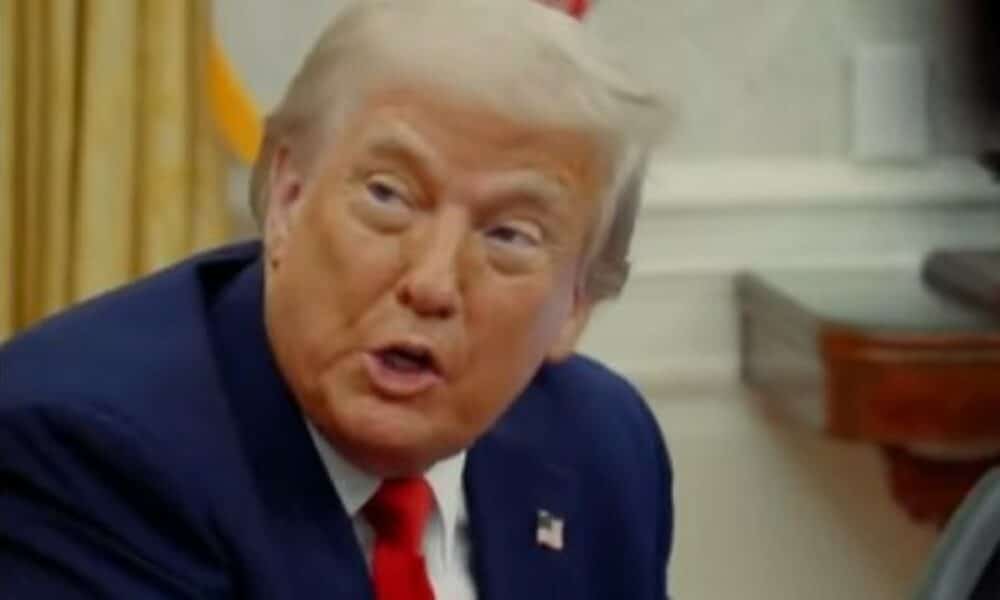Donald Trump signed an executive order aimed at reshaping the live event ticketing landscape in the United States, targeting scalpers who profit from inflated prices. The signing ceremony, held in the Oval Office, featured musician Kid Rock, a vocal advocate for ticketing reform, by the president’s side. Announced on March 31, the measure seeks to curb practices like the use of bots to snatch up tickets in bulk and resell them at exorbitant rates—a frustration that has plagued fans for decades. The move has been praised by industry players like Live Nation and could affect everything from major tours to local gigs.
The order directs Treasury Secretary Scott Bessent and Attorney General Pam Bondi to ensure resellers comply with Internal Revenue Service (IRS) regulations, particularly regarding profits from ticket sales. It also tasks the Federal Trade Commission (FTC) with enforcing competition laws and promoting price transparency throughout the ticket-buying process. Kid Rock, sporting a red suit emblazoned with American flags, called the action “a great first step” toward addressing what he described as a “riddle” for music lovers.
For the musician, the exasperation of trying to buy tickets online, only to see them snapped up by bots and resold at prices up to 70 times their face value, cuts across political lines. Trump, meanwhile, admitted he wasn’t deeply familiar with the issue until recently but emphasized its significance after digging into it. The measure has garnered support from companies like Ticketmaster, long criticized for mishandling high-profile sales like Taylor Swift’s 2022 Eras Tour.
What sparked the executive order
The skyrocketing cost of tickets has been a simmering issue, thrust into the spotlight by recent high-profile debacles that laid bare the live entertainment market’s flaws. The chaotic sale of Taylor Swift’s Eras Tour stands out, when Ticketmaster’s site crashed under overwhelming demand, leaving fans to face astronomical prices on the secondary market. That fiasco prompted a Senate hearing and an antitrust probe into Ticketmaster and its parent company, Live Nation, accused of monopolistic practices that stifle competition and drive up costs.
Kid Rock, who had been pushing for change for months, met with Pam Bondi in December to discuss the matter. He argued that scalpers, coupled with hidden fees, hurt both fans and artists, who see no benefit from resale profits. The executive order emerges as a response to this pressure, reflecting a broader call for reforms to make cultural events more accessible to Americans.
The White House underscored the live entertainment sector’s importance, employing roughly 913,000 people and generating an economic impact of 132.6 billion dollars annually. Yet, it noted that “unscrupulous middlemen” have undermined the industry by imposing “exorbitant fees” that don’t trickle down to performers. Trump’s action is framed as an effort to restore control to consumers and safeguard access to culture.
Breaking down the new rules
The executive order zeroes in on three key areas to tackle scalpers and enhance the fan experience. First, it mandates that resellers adhere to tax laws, leveraging a 2023 rule requiring platforms like StubHub and Ticketmaster to report seller profits exceeding 600 dollars to the IRS. This could lead to additional taxes for those raking in hefty gains from resales.
Second, it strengthens enforcement of the 2016 BOTS Act, which bans automated software from scooping up tickets en masse. Though on the books for nearly a decade, the law has seen scant action, with just two enforcement cases logged by the FTC. Finally, the order pushes for price transparency, requiring sellers to display the full cost—including fees—upfront, eliminating surprises at checkout.
- Tax compliance: Resellers must report profits to the IRS, facing penalties for noncompliance.
- Bot crackdown: The FTC and Justice Department will ramp up oversight of illegal software use.
- Clear pricing: Fans will know the true ticket cost from the start, with no hidden fees.
Industry reactions
Live Nation, a titan in concert promotion and ticketing, hailed Trump’s initiative. In a statement, the company said “scalpers and bots prevent fans from getting tickets at the prices artists set” and thanked the president for “taking them on headfirst.” CEO Michael Rapino also voiced support for reforms bolstering the BOTS Act and capping resale prices.
Kid Rock went further, urging Congress to pass legislation setting a ceiling on resale values. He acknowledged being “overpaid” as an artist but said he’d rather be a “working-class hero” by offering affordable tickets. Ticketmaster, despite its checkered past, signaled alignment with the changes, hinting at a rare unity among artists, companies, and the government.
The musician’s flamboyant presence in the Oval Office, complete with his bedazzled suit and fervent speech, lent the event a distinctive flair. He quipped about the order’s swift drafting, thanking Trump for acting “at the speed of light.” The president, upon signing, handed the document to Kid Rock with a playful jab: “You’d better do well with this.”
A long-standing issue in the spotlight
Surging ticket prices trace back to the secondary market, where scalpers wield advanced tech to profit at fans’ expense. Reports show some consumers have paid up to 70 times a ticket’s original price, as noted in the White House fact sheet. The rise of bots, which sell out inventories in seconds, has worsened the problem, leaving fans with no choice but to turn to costly resales.
Taylor Swift’s 2022 tour became a tipping point. Unprecedented demand crashed Ticketmaster’s system, and tickets resurfaced on secondary platforms at sky-high rates. Swift called it “excruciating,” while fans protested and appealed to lawmakers. The episode spurred the Senate to probe Live Nation’s market dominance, leading to a still-pending Justice Department lawsuit filed in 2024.
Other artists, like Beyoncé, faced similar woes. In 2023, ahead of her Renaissance Tour sales, the Senate Judiciary Committee warned Ticketmaster to shape up. These incidents fuel the view that the current system favors scalpers over consumers and performers alike.
What fans can expect
With the new order, fans may see gradual shifts in ticket buying. Transparent pricing should ease the sting of unexpected costs, as Kid Rock put it: “You buy a 100-dollar ticket, and by checkout, it’s 170.” Tougher bot enforcement could also boost access to fairly priced tickets, though success hinges on federal agencies’ follow-through.
The measure doesn’t fix every flaw in the live event market but signals a push to balance the interests of fans, artists, and companies. For Trump, it’s a chance to win broad support on a bipartisan issue. Kid Rock underscored this universal appeal: “No matter your politics, everyone wants fair tickets.”
He also voiced hope for a legal cap on resale prices, a step requiring Congressional action. Calling himself a capitalist, he argued excessive scalper profits help no one in the ecosystem. The idea resonates with fans and artists who’ve long sought sweeping reforms.
Timeline of key moments
The battle against scalpers and price gouging has a storied past in the U.S. Here’s a look at pivotal events:
- 2016: The BOTS Act passes, banning bulk ticket-buying software, but enforcement lags.
- 2022: Taylor Swift’s Eras Tour sale implodes, forcing Ticketmaster to scrap public sales.
- 2023: A new law mandates platforms report reseller profits to the IRS, taking effect that year.
- 2024: The Justice Department sues Live Nation for monopolistic practices, escalating scrutiny.
- March 31, 2025: Trump signs the executive order with Kid Rock, marking a fresh push.
Early praise and skepticism
The order has drawn mostly positive feedback from entertainment stakeholders. Live Nation reiterated its commitment to fighting bots and scalpers, while artists like Kid Rock see it as progress. Fans, via social media, expressed cautious optimism, hoping the changes trickle down to everyday purchases.
Still, some question its feasibility. The FTC and Justice Department, already stretched thin, may need extra resources to police the market effectively. Relying on a 2023 tax law from the Biden era also raises concerns about coordination under a government eyeing budget cuts, as pushed by figures like Elon Musk.
Even so, Kid Rock’s flair and the ceremony’s light moments gave the order standout visibility. Trump fielded questions—mostly from friendly outlets—commenting on the musician’s patriotic suit, while Kid Rock hoisted the signed document with a rallying cry: “Make America Fun Again.”
Potential next steps
The executive order is just a starting point for what could become broader reforms. Kid Rock made clear his endgame is legislation capping resale prices, a move needing Congressional approval. He pointed to European models with similar limits as inspiration for the U.S.
Meanwhile, pressure on Ticketmaster and Live Nation is likely to grow. The ongoing antitrust suit could dovetail with Trump’s order, pushing these giants to rethink their practices. For fans, the measure’s success will hinge on easier access to tickets without inflated resales—a test time will judge.
The initiative also puts Trump in an unusual spot of alignment with artists like Taylor Swift, who’ve slammed the ticketing market. Despite political divides, their shared goal of protecting consumers creates unexpected common ground. Whether Trump leverages this for cultural clout remains to be seen.
Highlights from the signing
The order’s signing brought levity to a serious issue. A few standout moments caught eyes:
- Kid Rock rocked a red suit with rhinestones, flags, and eagles, sparking online buzz.
- Trump signed the order after a lengthy Q&A, realizing late he hadn’t yet done so.
- The musician joked about being “overpaid” and wanting to be a “working-class hero.”
These quirks gave the event a memorable twist, cementing Trump and Kid Rock’s partnership on an issue hitting home for millions of Americans.

Donald Trump signed an executive order aimed at reshaping the live event ticketing landscape in the United States, targeting scalpers who profit from inflated prices. The signing ceremony, held in the Oval Office, featured musician Kid Rock, a vocal advocate for ticketing reform, by the president’s side. Announced on March 31, the measure seeks to curb practices like the use of bots to snatch up tickets in bulk and resell them at exorbitant rates—a frustration that has plagued fans for decades. The move has been praised by industry players like Live Nation and could affect everything from major tours to local gigs.
The order directs Treasury Secretary Scott Bessent and Attorney General Pam Bondi to ensure resellers comply with Internal Revenue Service (IRS) regulations, particularly regarding profits from ticket sales. It also tasks the Federal Trade Commission (FTC) with enforcing competition laws and promoting price transparency throughout the ticket-buying process. Kid Rock, sporting a red suit emblazoned with American flags, called the action “a great first step” toward addressing what he described as a “riddle” for music lovers.
For the musician, the exasperation of trying to buy tickets online, only to see them snapped up by bots and resold at prices up to 70 times their face value, cuts across political lines. Trump, meanwhile, admitted he wasn’t deeply familiar with the issue until recently but emphasized its significance after digging into it. The measure has garnered support from companies like Ticketmaster, long criticized for mishandling high-profile sales like Taylor Swift’s 2022 Eras Tour.
What sparked the executive order
The skyrocketing cost of tickets has been a simmering issue, thrust into the spotlight by recent high-profile debacles that laid bare the live entertainment market’s flaws. The chaotic sale of Taylor Swift’s Eras Tour stands out, when Ticketmaster’s site crashed under overwhelming demand, leaving fans to face astronomical prices on the secondary market. That fiasco prompted a Senate hearing and an antitrust probe into Ticketmaster and its parent company, Live Nation, accused of monopolistic practices that stifle competition and drive up costs.
Kid Rock, who had been pushing for change for months, met with Pam Bondi in December to discuss the matter. He argued that scalpers, coupled with hidden fees, hurt both fans and artists, who see no benefit from resale profits. The executive order emerges as a response to this pressure, reflecting a broader call for reforms to make cultural events more accessible to Americans.
The White House underscored the live entertainment sector’s importance, employing roughly 913,000 people and generating an economic impact of 132.6 billion dollars annually. Yet, it noted that “unscrupulous middlemen” have undermined the industry by imposing “exorbitant fees” that don’t trickle down to performers. Trump’s action is framed as an effort to restore control to consumers and safeguard access to culture.
Breaking down the new rules
The executive order zeroes in on three key areas to tackle scalpers and enhance the fan experience. First, it mandates that resellers adhere to tax laws, leveraging a 2023 rule requiring platforms like StubHub and Ticketmaster to report seller profits exceeding 600 dollars to the IRS. This could lead to additional taxes for those raking in hefty gains from resales.
Second, it strengthens enforcement of the 2016 BOTS Act, which bans automated software from scooping up tickets en masse. Though on the books for nearly a decade, the law has seen scant action, with just two enforcement cases logged by the FTC. Finally, the order pushes for price transparency, requiring sellers to display the full cost—including fees—upfront, eliminating surprises at checkout.
- Tax compliance: Resellers must report profits to the IRS, facing penalties for noncompliance.
- Bot crackdown: The FTC and Justice Department will ramp up oversight of illegal software use.
- Clear pricing: Fans will know the true ticket cost from the start, with no hidden fees.
Industry reactions
Live Nation, a titan in concert promotion and ticketing, hailed Trump’s initiative. In a statement, the company said “scalpers and bots prevent fans from getting tickets at the prices artists set” and thanked the president for “taking them on headfirst.” CEO Michael Rapino also voiced support for reforms bolstering the BOTS Act and capping resale prices.
Kid Rock went further, urging Congress to pass legislation setting a ceiling on resale values. He acknowledged being “overpaid” as an artist but said he’d rather be a “working-class hero” by offering affordable tickets. Ticketmaster, despite its checkered past, signaled alignment with the changes, hinting at a rare unity among artists, companies, and the government.
The musician’s flamboyant presence in the Oval Office, complete with his bedazzled suit and fervent speech, lent the event a distinctive flair. He quipped about the order’s swift drafting, thanking Trump for acting “at the speed of light.” The president, upon signing, handed the document to Kid Rock with a playful jab: “You’d better do well with this.”
A long-standing issue in the spotlight
Surging ticket prices trace back to the secondary market, where scalpers wield advanced tech to profit at fans’ expense. Reports show some consumers have paid up to 70 times a ticket’s original price, as noted in the White House fact sheet. The rise of bots, which sell out inventories in seconds, has worsened the problem, leaving fans with no choice but to turn to costly resales.
Taylor Swift’s 2022 tour became a tipping point. Unprecedented demand crashed Ticketmaster’s system, and tickets resurfaced on secondary platforms at sky-high rates. Swift called it “excruciating,” while fans protested and appealed to lawmakers. The episode spurred the Senate to probe Live Nation’s market dominance, leading to a still-pending Justice Department lawsuit filed in 2024.
Other artists, like Beyoncé, faced similar woes. In 2023, ahead of her Renaissance Tour sales, the Senate Judiciary Committee warned Ticketmaster to shape up. These incidents fuel the view that the current system favors scalpers over consumers and performers alike.
What fans can expect
With the new order, fans may see gradual shifts in ticket buying. Transparent pricing should ease the sting of unexpected costs, as Kid Rock put it: “You buy a 100-dollar ticket, and by checkout, it’s 170.” Tougher bot enforcement could also boost access to fairly priced tickets, though success hinges on federal agencies’ follow-through.
The measure doesn’t fix every flaw in the live event market but signals a push to balance the interests of fans, artists, and companies. For Trump, it’s a chance to win broad support on a bipartisan issue. Kid Rock underscored this universal appeal: “No matter your politics, everyone wants fair tickets.”
He also voiced hope for a legal cap on resale prices, a step requiring Congressional action. Calling himself a capitalist, he argued excessive scalper profits help no one in the ecosystem. The idea resonates with fans and artists who’ve long sought sweeping reforms.
Timeline of key moments
The battle against scalpers and price gouging has a storied past in the U.S. Here’s a look at pivotal events:
- 2016: The BOTS Act passes, banning bulk ticket-buying software, but enforcement lags.
- 2022: Taylor Swift’s Eras Tour sale implodes, forcing Ticketmaster to scrap public sales.
- 2023: A new law mandates platforms report reseller profits to the IRS, taking effect that year.
- 2024: The Justice Department sues Live Nation for monopolistic practices, escalating scrutiny.
- March 31, 2025: Trump signs the executive order with Kid Rock, marking a fresh push.
Early praise and skepticism
The order has drawn mostly positive feedback from entertainment stakeholders. Live Nation reiterated its commitment to fighting bots and scalpers, while artists like Kid Rock see it as progress. Fans, via social media, expressed cautious optimism, hoping the changes trickle down to everyday purchases.
Still, some question its feasibility. The FTC and Justice Department, already stretched thin, may need extra resources to police the market effectively. Relying on a 2023 tax law from the Biden era also raises concerns about coordination under a government eyeing budget cuts, as pushed by figures like Elon Musk.
Even so, Kid Rock’s flair and the ceremony’s light moments gave the order standout visibility. Trump fielded questions—mostly from friendly outlets—commenting on the musician’s patriotic suit, while Kid Rock hoisted the signed document with a rallying cry: “Make America Fun Again.”
Potential next steps
The executive order is just a starting point for what could become broader reforms. Kid Rock made clear his endgame is legislation capping resale prices, a move needing Congressional approval. He pointed to European models with similar limits as inspiration for the U.S.
Meanwhile, pressure on Ticketmaster and Live Nation is likely to grow. The ongoing antitrust suit could dovetail with Trump’s order, pushing these giants to rethink their practices. For fans, the measure’s success will hinge on easier access to tickets without inflated resales—a test time will judge.
The initiative also puts Trump in an unusual spot of alignment with artists like Taylor Swift, who’ve slammed the ticketing market. Despite political divides, their shared goal of protecting consumers creates unexpected common ground. Whether Trump leverages this for cultural clout remains to be seen.
Highlights from the signing
The order’s signing brought levity to a serious issue. A few standout moments caught eyes:
- Kid Rock rocked a red suit with rhinestones, flags, and eagles, sparking online buzz.
- Trump signed the order after a lengthy Q&A, realizing late he hadn’t yet done so.
- The musician joked about being “overpaid” and wanting to be a “working-class hero.”
These quirks gave the event a memorable twist, cementing Trump and Kid Rock’s partnership on an issue hitting home for millions of Americans.







